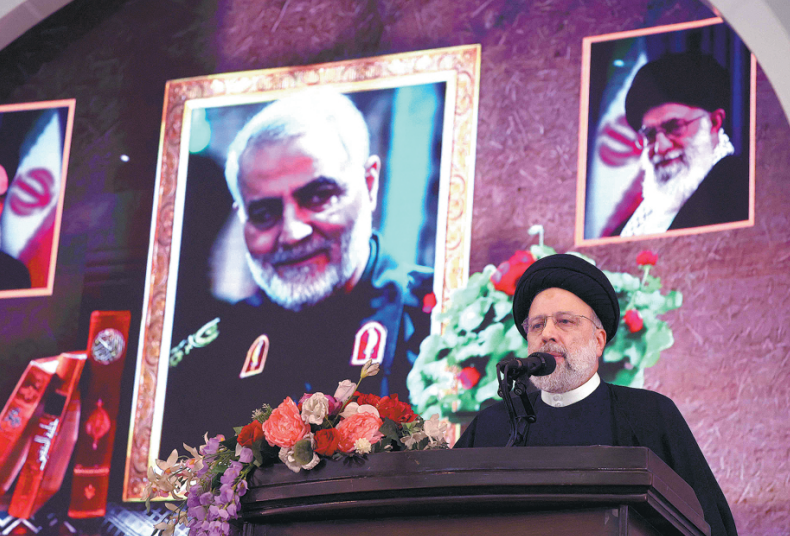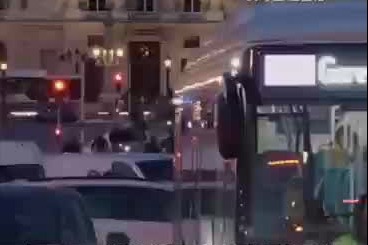Focus kept on justice 3 years after killing
By JAN YUMUL and XU WEIWEI in Hong Kong | China Daily Global | Updated: 2023-01-05 06:56

But Iran's quest through international courts faces challenges, analysts say
As Iran mourned on Tuesday the third anniversary of the killing of top general Qassem Soleimani, the authorities remain determined to secure justice over the assassination.
Donald Trump, then president of the United States, ordered the fatal strike on Soleimani, 62, on Jan 3,2020. The action was condemned by the Iranian Foreign Ministry as an act of "state terrorism".
But analysts said negative sentiment directed against Iran by the West could hinder the country's efforts to pursue justice in international courts.
Iranians gathered on Tuesday across the country to remember Soleimani, the commander of the Quds Force of the Islamic Revolutionary Guard Corps, or IRGC. He was one of the country's most popular public figures.
"We have not forgotten and will not forget about avenging the top commander's blood," Iranian President Ebrahim Raisi was quoted by Xinhua News Agency as telling the crowds. He described Soleimani as a symbol of the fight against oppression and global arrogance.
In September at the United Nations General Assembly, Raisi held up a photo of Soleimani and said his country will seek justice for the assassination through a fair tribunal.
Mehran Kamrava, director of the Iranian Studies Unit at the Arab Center for Research and Policy Studies in Doha, Qatar, told China Daily that sentiment in Europe is now "firmly against Iran", reinforced by Iran's support for Russia in the Ukraine conflict and the protests in Iran that have broken out since September last year.
Kamrava cited Germany as an example for recently suspending "the little economic trade it had with Iran". Also, he said the United Kingdom is mulling whether to designate the IRGC a terrorist organization — the same designation it uses for the Islamic State and the Taliban.
External environment
"Within such an external environment, there is little recourse to Iran in international courts over the killing of Soleimani," he said. "It would not, therefore, be surprising to see Iran resort to clandestine operations against those it sees as responsible to avenge Soleimani's killing."
He added that the action may not come for some time because Iran is known to often "play the long game".
In Baghdad, Iraqis also rallied to mark the anniversary at al-Tahrir Square. Aside from pictures of Soleimani, they also held up images of Abu Mahdi al-Muhandis, who had served as deputy chief of Iraq's paramilitary Hashd Shaabi forces.
Both men were killed in the US drone attack on a convoy of vehicles near Baghdad International Airport three years ago. Both had played important roles in the war against the Islamic State terror group.
Trump alleged that the generals were planning an "imminent "attack on US military personnel in the Iraqi capital.
Iran has on many occasions said that it would take Trump and all those involved in the killing to international courts.
A senior Iranian judicial official said 94 US nationals, including Trump and former US secretary of state Mike Pompeo, have been charged with involvement in Soleimani's killing, Iran's Mehr news agency reported on Tuesday.
In a statement on Tuesday, Iran's Foreign Ministry said it was working with relevant institutions to pursue the case, stressing that the US "bears definite responsibility for this crime on the basis of international standards".
However, Asif Shuja, a senior research fellow in the Middle East Institute at the National University of Singapore, told China Daily that unlike the case with national judicial systems, international courts have limitations in terms of delivery as well as enforcement of justice.
However, he said favorable rulings in international courts "will help a nation in holding a moral high ground and creating suitable precedence in future actions".
"Since antagonism against the US is a crucial pillar of the Islamic republic, and the US was widely seen as the wrongdoer in the case, pursuing this case internationally will serve Iranians well in terms of legitimizing their rule internally and creating grounds for actions in the future," said Shuja.
Contact the writers at jan@chinadailyapac.com.
























